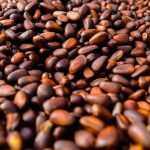Erucic acid is probably not on everyone’s hate list but is a compound in the food supply chain that we need to be mindful of. Surprisingly it is a contaminant in some vegetable oils like rapeseed oil but is not a major safety concern as the average exposure to it is less than half the safe level. The issue is the long-term health of children up to 10 years of age who consume large amounts of food containing erucic acid (EFSA, 2016) potentially through badly processed rapeseed oil. It is also an issue with animal feed, especially for chickens and can enter the food chain via this route.
Erucic acid is a monounsaturated omega-9 fatty acid found in the oils of many plant species in the Brassicaceae. The family includes rapeseeds, mustards, cabbages and calabrese but rapeseed and mustard are plant groups which contain especially high level of this fatty acid.
Erucic acid often enters the food chain through rapeseed oil (canola oil). The oil is commonly used for frying and home baking. The EFSA statement cites ‘pastries, cakes and infant/follow-on formulae and also in some animal feed (e.g. rapeseed meal)’ as common sources.
References
EFSA (2016) Erucic acid a possible health risk for highly exposed children. https://www.efsa.europa.eu/en/press/news/161109


Leave a Reply